|
|
|
Sort Order |
|
|
|
Items / Page
|
|
|
|
|
|
|
| Srl | Item |
| 1 |
ID:
185890
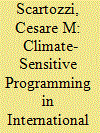

|
|
|
|
|
| Summary/Abstract |
Over the past three decades, United Nations (UN) Peace Operations have become increasingly multidimensional and integrated. Blue helmets, originally deployed to provide security and enforce cease-fires, are now engaging in multi-domain activities aimed at sustaining long-term peace. As part of this trend, the UN Security Council has begun mandating Peacekeeping Operations (PKOs) and Special Political Missions (SPMs) to engage in climate-sensitive programming. Questions, however, remain over the effectiveness of climate-related activities in peace operations. This study, using a large textual dataset, provides a comprehensive assessment and evaluation of the state of climate-sensitive programming in PKOs and SPMs. The findings indicate that while mandates and programming activities related to climate change have been on the rise, most field operations have failed to integrate climate-sensitive programming into their work. Moreover, the agenda on climate security appears to have led to a process of institutional decoupling between organizational arrangements and field activities.
|
|
|
|
|
|
|
|
|
|
|
|
|
|
|
|
| 2 |
ID:
185885
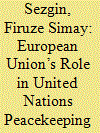

|
|
|
|
|
| Summary/Abstract |
The European Union (EU) repeatedly expresses its support to principles and values of the United Nations (UN), seeing the UN as the core of a rules-based global order. How does the EU perform in contributing personnel to UN peacekeeping operations, and what factors affect their personnel commitments? Recent work shows that the size of the deployed personnel matters for peacekeeping effectiveness, and personnel commitment is a crucial effort by the UN member states to prolong peace. This article’s contribution is to conduct the first analysis on the EU member states’ contribution rates on 53 UN peacekeeping operations throughout the last 30 years. By testing arguments of two general explanations for factors that affect peacekeeper contributions, the empirical findings reveal that although the EU members tend to contribute less to UN peacekeeping operations, they contribute significantly higher in the case of rising peacekeeper fatalities. However, the EU member states are less likely to contribute with humanitarian impulse or international security threat concerns. The findings suggest that no single theory can explain the contribution motives; instead, a wide range of interacting factors determine the decision to commit personnel to an operation.
|
|
|
|
|
|
|
|
|
|
|
|
|
|
|
|
| 3 |
ID:
185886
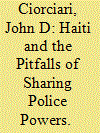

|
|
|
|
|
| Summary/Abstract |
This article examines the benefits and pitfalls of international policing in Haiti over the past quarter century. It shows the importance of the political foundations for joint policing arrangements. Haiti's experience illustrates that international personnel can provide useful stopgap policing services when the interests of national and international partners converge around public order crises. However, the Haitian case also shows how weak political commitment on one or both sides can lead to vague mandates, poor cooperation in the field, weak police accountability, and stalled domestic reforms. These problems have undermined the performance of international personnel and the Haitian National Police, eroding public trust in both. Ultimately, international intervention has failed to yield a capable, trusted, and apolitical Haitian police force or a notably stronger rule of law. Haiti thus offers a cautionary tale for international policing.
|
|
|
|
|
|
|
|
|
|
|
|
|
|
|
|
| 4 |
ID:
185888
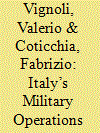

|
|
|
|
|
| Summary/Abstract |
A significant engagement in military missions is probably the most distinctive feature of post-Cold War Italian foreign policy. In the last three decades, Italy has participated in an extensive number of operations across the world, including those in Iraq, Afghanistan, and Libya. Several studies have described Italian troop deployments abroad, providing alternative explanations of the Italian military activism. However, despite a recent growing attention on the topic, mainly focusing on specific peacekeeping operations, a comprehensive investigation of the evolution of Italian interventions is still missing. In other words, a detailed picture of main trends, data and patterns – since the end of the Second World War – is lacking. This article aims to fill this gap, using the most detailed and complete data on Italy’s participation in peace and security operations to date. We show that Italian involvement steadily grew between 1990 and 2010 and decreased in the following ten years. Our empirical findings also indicate how Italy’s efforts were increasingly directed in the Mediterranean and North Africa region in recent years. The article contributes to the existing literature on military operations abroad by offering a broad quantitative perspective on the post-Cold War defence policy of a ‘middle power’.
|
|
|
|
|
|
|
|
|
|
|
|
|
|
|
|
| 5 |
ID:
185891
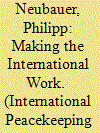

|
|
|
|
|
| Summary/Abstract |
Over the years, the police have become a central component of international peace- and statebuilding operations. However, predominantly trained and socialized as members of a domestic police service, police officers enter the global arena only – if ever – temporarily: their international deployment is often merely an interlude to their regular domestic police service. Pre-deployment training for international missions is therefore deemed vital for their success. When abroad, officers oftentimes find themselves carrying out work that has little resemblance to everyday police work back at home. By conceptualizing police training experts as “brokers”, the article helps to uncover the practices these brokers deploy to bridge the boundary between domestic policing and international missions. The research for this article was informed by practice theoretical considerations and ethnographically informed research strategies. It reveals that in several European countries, trainers’ brokerage is primarily practiced as a passing on of recent personal experience, by the creation of artificial borderlands that are meant to mimic the reality on the ground, and by diluting the boundary temporarily.
|
|
|
|
|
|
|
|
|
|
|
|
|
|
|
|
| 6 |
ID:
185889
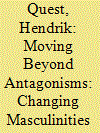

|
|
|
|
|
| Summary/Abstract |
In this paper, I theorize and empirically illustrate how security sector reforms (SSR) can transform violence-centred masculinities in post-conflict militaries. I argue that substantial change of such gender roles depends on challenging the power that is institutionally inscribed into the constructed antagonisms between (1) men and women, (2) fighters and civilians, and (3) perpetrators and victims of violence. A case study on changing masculinities within the Armed Forces of Liberia (AFL) via SSR illustrates this argument. During the violent conflict in Liberia between 1989 and 2003, the AFL infamously perpetrated large-scale violence against civilians, enacting particularly violent forms of masculinity. After the war, the AFL was dissolved and rebuilt with an emphasis on human rights and, partly, gender mainstreaming. Drawing from interviews with multiple stakeholders and practice-theoretical reasoning, the paper renders empirically and theoretically tangible that SSR can change institutional constructions of masculinity by challenging socially constructed antagonisms that give power to men, fighters, and perpetrators.
|
|
|
|
|
|
|
|
|
|
|
|
|
|
|
|
| 7 |
ID:
185887
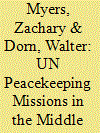

|
|
|
|
|
| Summary/Abstract |
While new ‘multidimensional’ peacekeeping missions emerged at the end of the Cold War, more ‘traditional’ monitoring missions continue to operate. This work reviews the three current peacekeeping missions in the Middle East, with mandates to monitor buffer lines or zones between Israel and its previously warring neighbours: the UN Truce Supervision Organization (UNTSO), the UN Disengagement Observer Force (UNDOF), and the UN Interim Force in Lebanon (UNIFIL). We provide an overview of these three missions, their mandates, the circumstances from which they emerged and evolved. We then consider causal factors that have contributed to their effectiveness over the years and examine how such factors apply in the current state of these missions. Finally, noting that the region evolves and so must the missions, we offer recommendations for how they could remain effective into the future by investing in new technological capabilities and maintaining the integration between their analysis units.
|
|
|
|
|
|
|
|
|
|
|
|
|
|
|
|
|
|
|
|
|